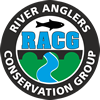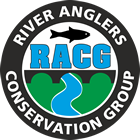Mission Statement
The RACG aims to promote the sustainable management and conservation of rivers and riverine habitats, for the benefit of river biota and angling.
Aims
-
Sustainable fish populations are intrinsically linked with healthy ecosystems which support a wide variety of wildlife. Rivers are under pressure from stressors (anthropogenic or otherwise), including but not limited to agriculture, increasing populations and water extraction, which require careful management to limit ecological effects. Therefore, we aim to collaborate with Environment Agency (EA hereafter) Fisheries Officers and support research that may be of interest to RACG members.
-
Some rivers have been extensively modified to accommodate societal needs of food production, energy generation etc. Thus, it is not always possible to restore a system to its original state. Artificial structures such as weirs, dams, hydropower schemes and flood barriers should be designed to have a negligible impact on river flows and fish passage. We aim to educate and inform our membership and the wider public of the benefits of increased river connectivity achieved by, for example, weir removal or fish pass installation. Where complete structure removals are not possible, we will promote the benefits of barrier modifications, such as the lowering of weirs and/or creation of bypass channels.
-
Abstraction for domestic, agricultural and industrial use from river and groundwater sources is expected to increase with increasing human populations. Abstraction would likely result in reduced flow rates which can have negative implications for river processes and so, native fauna and flora. The RACG supports the Environment Agency and other key stakeholders in their efforts to manage water reserves, and to manage the impacts of decreased flows. The RACG aims to educate its members in steps they can take to minimise domestic water usage.
-
Conditions (e.g. flow velocity, depth, sediment type etc.) within healthy river habitats are varied. Variable conditions should be encouraged through river management to help restore biodiversity, providing benefits to both people and wildlife. The RACG aims to build partnerships with local angling clubs/Trusts/organisations, so that it may perform or collaborate on various habitat improvement projects at local/catchment/nationwide scales.
-
The RACG supports the work of stakeholders involved in the monitoring of water quality and relevant legislation and enforcement. The RACG supports the Angling Trust and other relevant stakeholders involved in the regulation of water quality and associated legislation and will aim to educate its members on the effects of chemical pollution in rivers.
-
The RACG will investigate any matters of concern to river anglers in an impartial and scientific manner, often in collaboration with industry experts and/or key stakeholders.
-
The RACG aims to educate both anglers and the wider public regarding predation issues for UK waterways and fisheries. We welcome research and the gathering of data to increase our knowledge of predators and their impacts in fluvial systems.
-
The RACG acknowledges that rivers are a precious natural resource, and are in increasing need of protection and conservation. Our overall aim is to promote good practice in river restoration and management.

